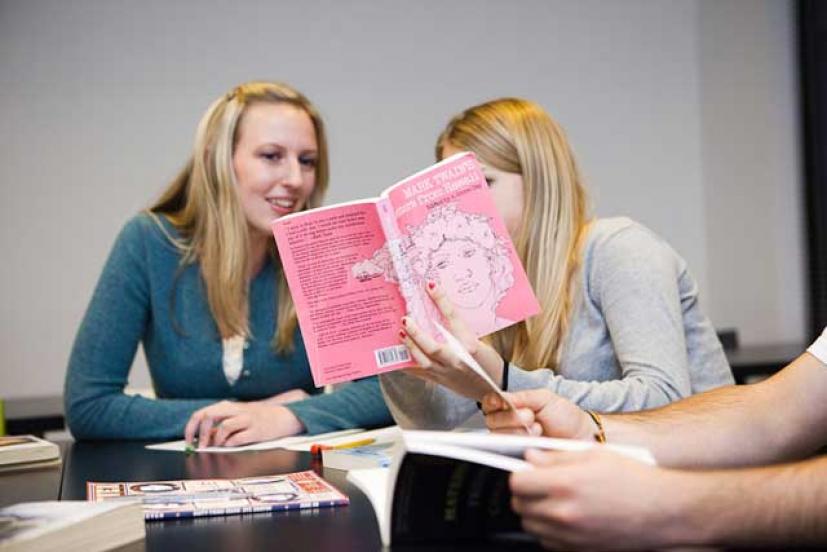Five Steps to Help Your Child Love Reading

 Marin Mommies presents a guest post by Sage Educators founder and Marin mom Jaime Heaps.
Marin Mommies presents a guest post by Sage Educators founder and Marin mom Jaime Heaps.
Often parents will ask us, “How can I encourage my child to love reading?”
We know that reading is essential to academic success and intellectual growth. A new study by the University of London’s Institute of Education found that “children who read for pleasure made more progress in math, vocabulary and spelling between the ages of 10 and 16 than did those who rarely read.”
However, many of our students struggle to connect to literature. They read the words but can’t connect. “It’s boring,” they say, or, “This sucks.”
What’s a parent to do?
- Understand the problem. Many of us enjoy reading because it allows us to lose ourselves in other worlds, to transcend our own experience and enter someone else’s. We read Hemingway’s stories and see the smoky cafés of Paris; we read Fitzgerald’s novels and hear the flapper dresses swishing. A child who says reading is “boring” may not be picturing what he or she reads. The child’s experience may resemble that of a native English speaker reading in French: he or she decodes the words on the page (knowing that “c-o-w” means “cow”) but does not think beyond them (imagining the cow in the field).
- Question, question, question. Sit down with your child and read together. After each paragraph, stop, ask questions, and prompt your child to answer you. Start simple: What do you see? What does it look like? What colors? How many? Do you hear anything? Your questions can help him or her develop the skills needed to visualize the story and make it come alive. It's amazing how a child’s relationship to literature will change once he or she is able to create a story’s images in his or her own mind.
- Build skills with a daily recap. Even simple questions can help younger children to exercise the muscle they need to start visualizing what they read. When sitting down with your child at dinner, ask him or her to recount the day. Don’t stop at “How was school today?” Instead, continue onto more and more specific questions: "What was the best part of your day? Tell me everything you remember! What did you do in English class today? What did it look like?" Every time your child answers a specific question, he or she will have to conjure the image, just as he or she would have to when reading a story. “Tell me everything you remember about math class today” is just a step towards "Tell me everything you see when Romeo is talking to Juliet on the balcony!"
- Reserve judgment. Reading is personal. It is subjective. When a student says he hates Shakespeare, or thinks TO KILL A MOCKINGBIRD is boring, we as teachers are horrified. We immediately want to start telling the student why these works are so wonderful and thus why the student “should” enjoy them. This pressure can turn kids off of reading completely. As adults, we dislike it when people tell us that our opinions are wrong ("But how could you not like broccoli? It's so wonderful!"), and children hate this, too. When discussing books with your child, try to hear his or her opinions without immediately judging them. Of course, all students will have to read books they don’t love, but when trying to foster a love of reading, it’s best to encourage them to follow their genuine interests. All reading is beneficial.
 Set an example. Observe your own behavior and the tone you are setting at home. Does your child see you reading? Do you read together, even if your child is capable of reading on his or her own? Do you make regular trips to the library or bookstore? Are there books around the house? Ideally, a love of reading can bring every member of the family together.
Set an example. Observe your own behavior and the tone you are setting at home. Does your child see you reading? Do you read together, even if your child is capable of reading on his or her own? Do you make regular trips to the library or bookstore? Are there books around the house? Ideally, a love of reading can bring every member of the family together.
Jaime Heaps is a Marin mom. In 2007, she and her husband, William, founded Sage Educators, a customized tutoring and test-prep center with offices in Mill Valley and Larkspur. Sage is a community of students and academic mentors—a fun, productive environment where kids in grades 3–12 can relax, focus, and thrive. For links to books recommended by Sage tutors, visit www.pinterest.com/sageeducators. For more information about Sage, call (415) 388-7243 or visit www.SageEducators.com.
Photos courtesy Sage Educators.






